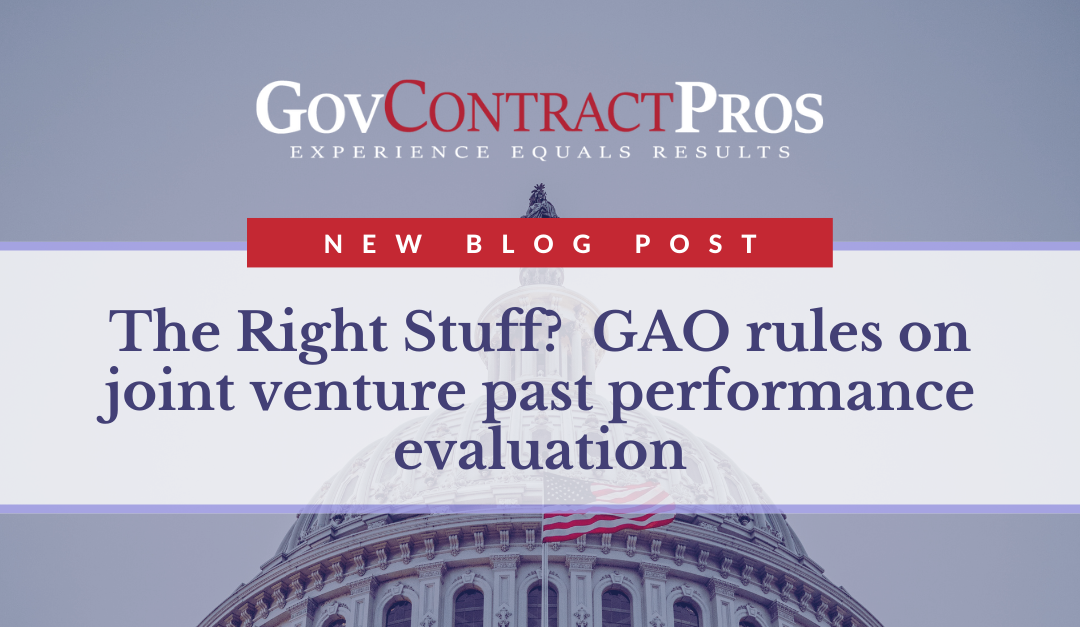Following the recent Court of Federal Claims (COFC) decision regarding the Polaris solicitation, the Government Accountability Office (GAO) has issued its own ruling on past performance evaluations for joint ventures.
The GAO’s decision in MiamiTSPi, LLC-Reconsideration highlights the importance of carefully reviewing each solicitation’s instructions to offerors, the evaluation criteria, and the selection of past performance references by a joint venture. In this reconsideration, MiamiTSPi, LLC (JV), consisted of Miami Technology Solutions, LLC (MTS), the 8(a) and Technology Solutions Provider, Inc. (TSPi). The JV submitted a quotation to the total small business set-aside request for quote (RFQ) issued by the General Services Administration (GSA), on behalf of the Department of Agriculture. Among the stated evaluation factors was “similar experience,” which required each offeror to identify a minimum of two relevant contracts that were either currently being performed or which have been completed in the last five years.
In responding to the RFQ, the JV submitted two projects to demonstrate its similar experience. The first example described work by TSPi as “Prime (member of a [joint venture] MTSPi)” for SBA and the second described the work performed again by TSPi for USDA. Not only was the first project performed by a different joint venture (MTSPi, not MiamiTSPi), but neither example described any work performed by MTS or mentioned MTS at all. GAO found “MiamiTSP’s quotation relied entirely on the experience of one joint venture partner, TSPi, without describing or demonstrating similar experience by the joint venture itself or by MTS, the 8(a) partner of the joint venture.”
GAO held that evaluation of past performance of small business joint ventures is regulated by 13 CFR 124.513(f), which states:
When evaluating the capabilities, past performance, experience, business systems, and certifications of an entity submitting an offer for an 8(a) contract as a joint venture established pursuant to this section, a procuring activity must consider work done and qualifications held individually by each partner to the joint venture as well as any work done by the joint venture itself previously.
The second part of the regulation states:
A procuring activity may not require the 8(a) Participant to individually meet the same evaluation or responsibility criteria as that required of other offerors generally. The partners to the joint venture in the aggregate must demonstrate the past performance, experience, business systems, and certifications necessary to perform the contract.
In short, GAO held that “nothing in the rule prohibits an agency from applying any evaluation or responsibility criteria to the 8(a) partner of the joint venture. Instead, the rule provides that the agency may not require the 8(a) partner to meet the same evaluation or responsibility criteria as that of other offerors”. Moreover, it appears that GAO did not find GSA’s contention, that the RFQ’s evaluation criteria as written permitted the agency to attribute the past performance of a single venturer to a joint venture, as permitted by the regulation. In other words, the regulations at 13 CFR 124.513(f) overrule the express language, or at least an agency’s interpretation, of its own solicitation.
Recognizing the popularity of joint ventures, the decision from GAO is a welcome one, in that it provides additional clarity to the Federal marketplace regarding identification and submission of past performance references. If you have questions regarding this decision, or past performance references, please contact Trevor Skelly.


Recent Comments